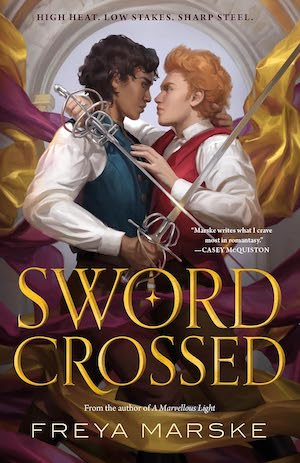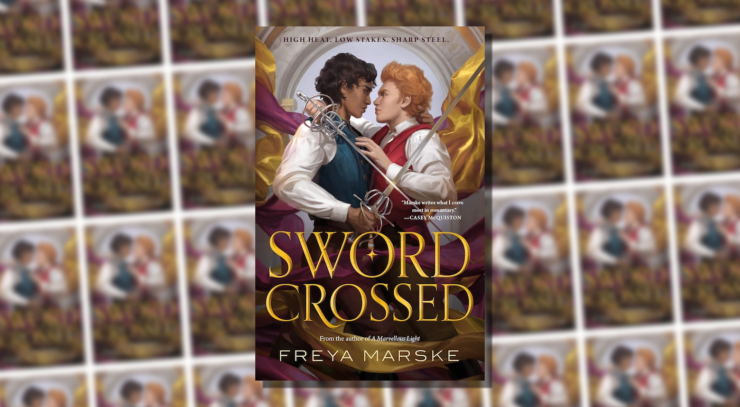While you were partying, Freya Marske studied the blade… the blade being fantasy romance, but also in fact dueling. She has established herself as an expert of the queer romantasy with her Last Binding series, which flawlessly intertwined the emotional stakes of at least three different love stories with the entire fate of alternate-history Britain. Although her latest standalone, Swordcrossed, is all about challenging for someone’s loyalty and love, the irony is that this novel need not go to all that trouble because readers are basically already guaranteed to fall for it. Yet it does so anyway with panache, heart, and steamy swordfighting scenes.
Mattinesh Jay, beleaguered heir to his family’s floundering wool business, is embarking on a most lucrative deal: an arranged marriage to Sofia Cooper, whose family’s winery will bolster the Jays’ debts that have been caused by a cascade of misfortune. Matti has managed to hide their dire straits, spending money around Glassport as expected of the first son of a well-to-do family, but he needs an insurance policy against that anxiety-inducing question at any nuptials—does anyone wish to challenge against the marriage? Between Sofia’s musician lover Adrian Vane and the gods themselves, Matti doesn’t want to risk any chances of this union not going through and further damaging the Jays’ standings among the other merchant and artisan guilds.
So he hires as his best man Luca Piere, a charming con man and accomplished swordsman newly arrived in Glassport. Not Matti’s first choice, but the flame-haired rogue had already cheated him out of a third of his strained budget, so he has unwittingly invested in Luca’s antics and might as well see it through to the bitter end. And of course, this stranger has such a pretty smile and irritating swagger. As these things go, the various familiar wedding rituals—plus some morning sword lessons that Matti negotiates as his own little wedding gift to himself—mean a lot of interludes spent in close (sweaty) quarters, in a hyper-compressed period of time. It would be ridiculous if they didn’t fall in love.
Buy the Book


Swordcrossed
Balancing on the knife’s-edge of tension is the obvious secret that Luca is hiding that would unravel everything. And while there are certainly threads that the reader can tug sooner, part of the delight is in being swept along so that when the narrative rug is pulled out from under both men, it has the proper drama of a dealbreaker—and right before the big day, no less!
At a book launch last fall for A Power Unbound, Marske teased that the biggest romance influence on Swordcrossed is the 2005 queer indie rom-com Imagine Me & You, about (I’m paraphrasing) “the inconvenience of falling for your wedding vendor.” While there is some of that movie’s “oh shit” meet-cute to Matti and Luca’s instant and inconveniently-timed spark, the book resonates on a deeper level with the movie’s pathos—that is, the bride’s agonizing over whether being happy enough can last someone the rest of their life. Their fast-tracked friendship also brings to mind I Love You, Man, except with the added drama of “this has to end before the altar” that we’ve seen in films like The Wedding Planner. Luca’s tendency to collect a bevy of fancy waistcoats—some flattering with his fiery hair, some very much not—vividly brings to mind Katherine Heigl’s overstuffed closet in 27 Dresses. Marske works familiar rom-com wedding tropes into the fantasy worldbuilding so subtly that each beat’s reveal is delicious, like the moment halfway into A Knight’s Tale when you remember that it’s a sports movie.
What’s more, Marske builds upon the historical origins of the best man—that is, someone defending a bride from would-be kidnappers—and weaves it into the culture of her world so cunningly that you forget it came from a separate source material. She treads familiar but not repetitive ground from The Last Binding, which infused its various contracts and bargains with intense emotional dimensions including class, trauma, grief, and of course queer desire. There is a similarly charged contract at play here, but Matti and Luca’s dynamic has the added financial component of contractor and customer (with a wink of kink) due to the bylaws of their respective guilds, as well as the achingly personal interrogations of what characters can afford, in both the literal and figurative sense. For young men struggling beneath expectations to support an entire family, spending money in order to do nothing is a rare luxury.
As Marske explained on the Smart Bitches, Trashy Books podcast, Swordcrossed is a fantasy of manners, which means lower stakes than in other romantasy, but not in a way that undermines itself. Yes, cozy fantasy has become a recently popular subgenre precisely because the events it depicts are slice-of-life rather than epic prophecies or apocalypses. Yet there’s a cleverness to Swordcrossed’s supposed low stakes, as it reflects real-life weddings in our world: No one will care about the minutiae as much as the people getting married; there is very little that’s unique, everyone goes through roughly the same hurdles; yet to you, it’s everything. It’s your whole world for however long the planning process stretches, and your big day can feel like it hinges on all-or-nothing actions.
Marske adeptly achieves this by establishing Glassport’s unwavering tenet that, despite guild members’ frequent invocations to their patron deities, religion is less essential than ritual itself. Glassport lives and dies by the movements of people between families, assuming new names via marriage or as an announcement of one’s true self; none of these rites of passage can occur without, yes, the theater of an imagined interloper representing a challenge to be overcome. In short, wedding vows aren’t just sentimental promises between the two people standing on the altar, but business deals hammering out concrete terms between families and industries, cementing dozens or hundreds of people’s futures. The only figure who’s allowed to pretend at opposition is the swords(wo)man, who is paid to play a role; to actually challenge those norms could shatter everything. (And there is so much delicious tension that Marske mines with the concept of what one pays for versus what they get, and what one accepts money to do versus does for free.)
As with the Last Binding, siblings are keen mirrors for our romantic leads—particularly Matti’s sister Mayanesh, who affectionately targets both men’s foibles while not letting either off the hook for their emotional hangups. Maya joining as an associate in unraveling the conspiracy around the Jays’ decline serves as a necessary reminder that often there’s a love story happening right in the background of yours, and that for those players the stakes are just as high.
Like a memorable wedding, Swordcrossed has lovingly-described textiles and desserts, an awkward but still sweet dance routine, and even a surprise appearance at the altar. Explain to me how I guessed what was coming and still teared up at that moment! That’s the beauty of a meticulously planned celebration by a supremely talented writer.
Swordcrossed is published by Bramble.
Read an excerpt.










